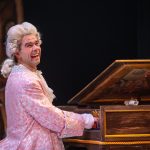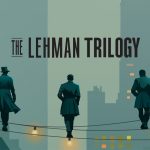Lions and Tigers and Strings — Oh My!
The MSO takes on The Wizard of Oz in a film with orchestra concert.

International acclaimed conductor Sarah Hicks will join the Milwaukee Symphony Orchestra to deliver a film with orchestra experience with “The Wizard of Oz.”
The Milwaukee Symphony Orchestra will bring down the house this week, or at least the house lights, as it screens the classic movie, The Wizard of Oz, while the orchestra plays the film score.
“It’s a real music and film experience — something you don’t get to see often,” says Sarah Hicks, an internationally acclaimed pops conductor who will lead the orchestra in this family-friendly cinematic experience.
Although this is the first time Hicks tackles the Wizard of Oz, she has considerable experience in this genre, having conducted orchestras for films like Psycho, Singing in the Rain and West Side Story, not to mention the world premiere of a concert dedicated to films by Disney’s Pixar.
Hicks says it is the “charming” qualities of the 1939 Academic Award winning score that helped make The Wizard of Oz an iconic film. Composer Herbert Stothart’s score represents of period of cinematic music that was more integrated into the plot and texture of the film.
“The music is really it’s own character,” Hicks says. “A lot of the scores we have today are there to make a background mood. There’s nothing background about it — it’s very much foreground.”
Part of the challenge for this performance, however, is that the MSO will only be reproducing the film’s musical score while using the movie’s original dialogue and singing. This requires the orchestra to perform in line with the singers, not the other way around.
“I always joke that these are the worst singers to work with,” Hicks says. “They don’t follow you; they don’t look at you. That’s a tremendous challenge.”
To accomplish this daunting task, Hicks will be reading from a monitor near her music stand that displays an analog clock counting down each section of the film. As a result, the objective for Hicks’ performance is similar to that found in “Guitar Hero.”

The score for “The Wizard of Oz,” written by Herbert Stothard, was originally recorded in 1939. The work received the Academy Award for Best Original Music Score that year.
Except it’s considerably more intricate than a video game. Hicks must perform at least a second ahead of the film, her music sheets filled with markings that indicate exactly when action in the film is taking place. Her notes must be extremely precise, splitting seconds to make the timing perfect.
To make things even more complicated, members of the orchestra face away from the film and do not have their own clocks. For this reason, the entire production is based on a flawless performance from the conductor.
“We have to be incredibly flexible,” Hicks says, always adjusting the tempo to fit the needs of the film. The conductor must know exactly when Judy Garland will pause for a moment or take extra time on a note, and that means watching the film “over and over and over again.” Thankfully, that doesn’t seem to bother Hicks.
“How can you be sick of The Wizard of Oz?” she says, laughing. “I mean, it’s a classic.”
This is not the first orchestra and film event put on by the MSO this season. It also took on the animated adaptation to Raymond Brigg’s The Snowman in December. Hicks notes that performances like these tend to attract a broader audience, introducing the orchestra to people who would usually shy away from classical music.
“There are people who say, ‘Well, I don’t know anything about the orchestra or classical music,’” Hicks says. “But I say, no, you hear it all the time in popular culture. It’s always been there.”
For Hicks, that may be the most rewarding part of these productions. “I want to have as many people as possible experience the incredible magic of an orchestra.”
7 p.m. on April 12 and 2:30 p.m. on April 13 at the Marcus Center. Tickets range from $22 to $102, available at the MSO’s website or by calling (414) 291-7605.
Other events coming up:
Early Music Now will provide audiences with the chance to dive into the music of the 15th century France with the help of the New York-based Four Nations Ensemble.
Four Nations, which is comprised of soloists who are leading exponents of period instrument and vocal performance from the Renaissance, will tackle the works of Jean-Marie Leclair and Jean-Philippe Rameau.
5 p.m. on April 12 at the Helene Zelazo Center. Tickets range from $10-$40, $10 to $20 and are available online or by calling (414) 225-3113.
Florentine Opera Alumni Recital
The Florentine Opera is gearing up for his last production of the season— La Bohème — by welcoming back its 2010-11 studio artist, Scott Johnson for this year’s Alumni Recital.
Johnson will be performing his own selections of his work, as he prepares to take on the role of Schaunard in La Bohème.
7:30 p.m. on April 11 and 12 at the Florentine Opera Center. Tickets are $15 and are available at the Florentine’s website or by calling (414) 291-5700 ext. 224.
“Life, Love and Death” by Present Music
We previewed this concert last week. Present Music will be joined by traditional Irish singing star, Iarla Ó Lionáird, who will collaborate with the ensemble to deliver the contemporary classical work of Irish composer Donnacha Dennehy, called Grá agus Bás (Love and Death). The concert, titled “Life, Love and Death,” will also include a performance of “Life” by contemporary composer Louis Andriessen’s alongside a film by Marijke van Warmerdam. UW-Milwaukee faculty artists will exhibit multimedia installations, and Danceworks Artistic Director Dani Kuepper will present her choreography to Phil Kline’s “Exquisite Corpses.”
7:30 p.m. on April 11 at the Turner Hall Ballroom. Tickets range from $15-$35 and are available at Present Music’s website.





















Is “The Wizard of Oz” truly being shown via film projection or are people attempting to be nostalgic? I’m guessing it’s being shown via video projection and the event should therefore be referred to as a “music and video experience.”
“How can you be sick of The Wizard of Oz?” she says, laughing. “I mean, it’s a classic.” is a great quote from Sarah Hicks! Your review heralds this event as wonderful!